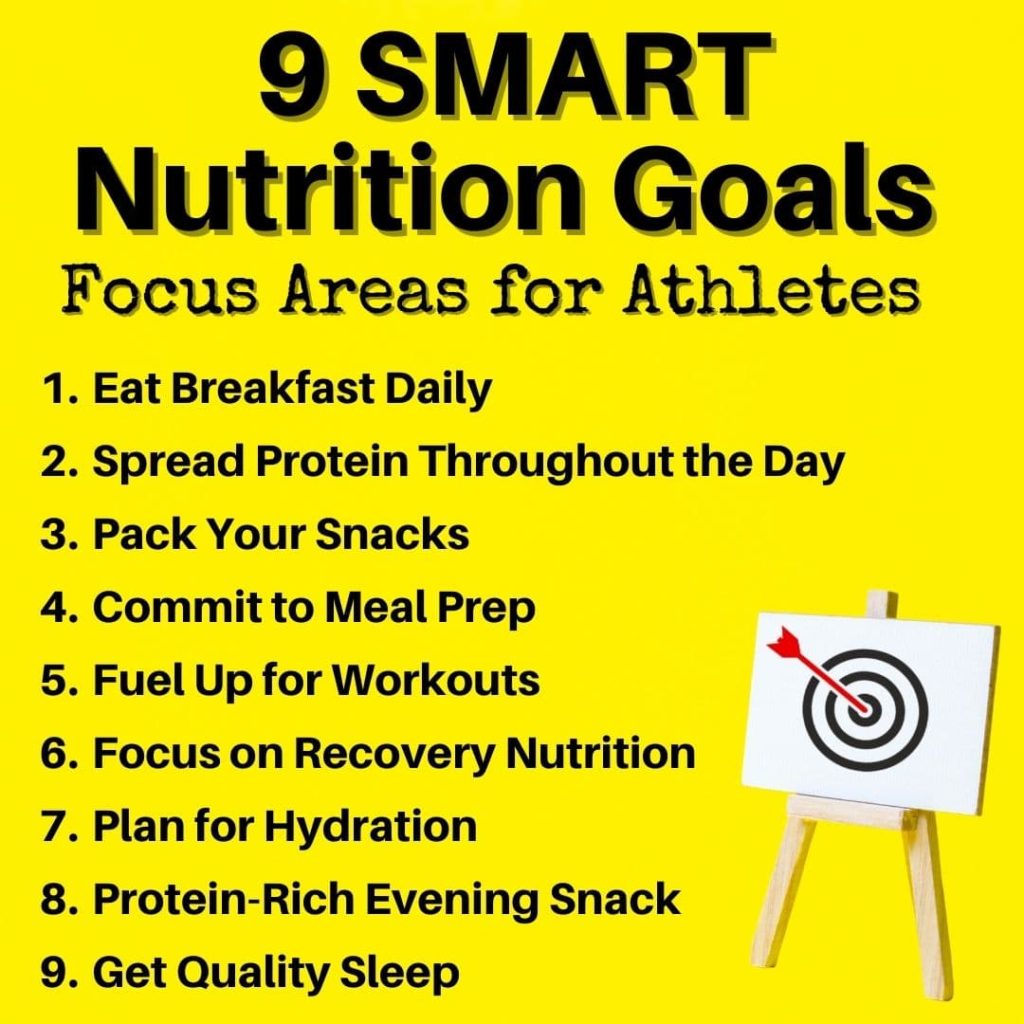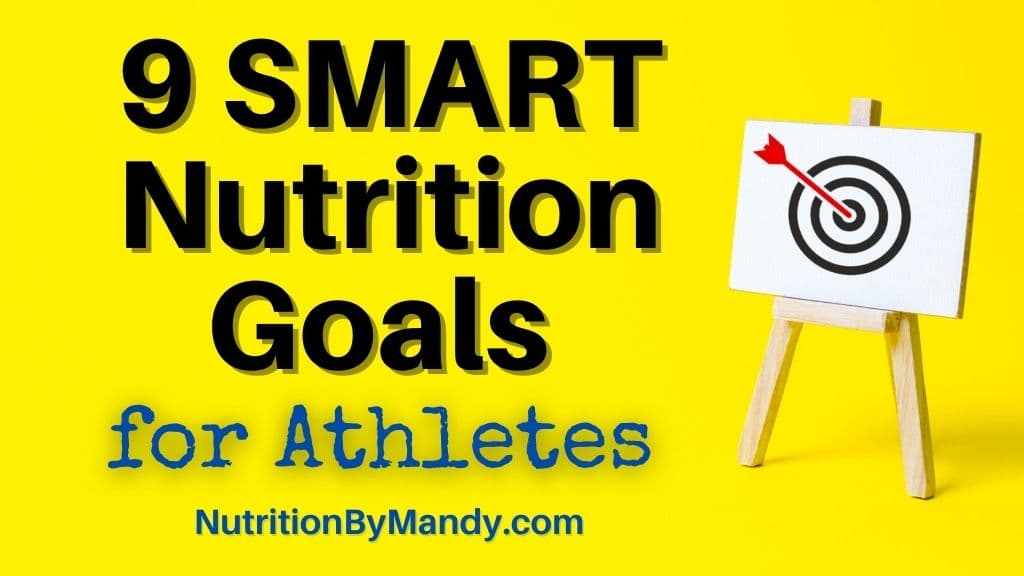Last Updated on December 10, 2025 by Mandy Tyler, M.Ed., RD, CSSD, LD
9 SMART Nutrition Goals for Athletes
Sports nutrition is a key component in supporting athletes with achieving optimal health and performance. Setting SMART nutrition goals can help athletes stay focused on strategies to ensure they are fueled to perform at their best.
Why Set Nutrition Goals?
As you work to improve your sports nutrition game plan, it is important to take responsibility for the choices you make. Making positive choices can benefit your sports performance and also improve your overall health and wellness.
Too often, I hear athletes make vague statements with regard to nutrition changes they want to make. If an athlete sets an unclear goal, such as to eat healthier, it can lead to feelings of frustration when no definite progress is made towards that goal.
What are SMART Nutrition Goals?
Setting a well-defined sports nutrition goal can help you stay focused and motivated towards what you want to accomplish.
Using the SMART goal setting method helps structure your goals so you have a clear plan of action (1).
I strongly believe in SMART goal setting, as I have seen the results both for myself and for the athletes I work with.
SMART Nutrition Goal Setting
Using the acronym SMART, goals should be:
- S – Specific: The goal should be written so it clearly identifies and defines what you want to accomplish.
- M – Measurable: The goal should be something you can quantify or measure progress towards.
- A – Achievable: Set a goal that is realistic for you to accomplish. The goal should be something you have to stretch or work towards accomplishing, but not be something that is impossible to achieve.
- R – Relevant: The goal is important to you and will progress you toward your performance goals.
- T – Time-bound: Set a clear, defined time-frame in which you will accomplish your goal.

9 SMART Nutrition Goals for Athletes
Now that you are familiar with SMART goal setting, let’s explore 9 sports nutrition related areas that athletes may consider setting goals in.

#1 Eat Breakfast Daily
Starting the day with a healthy breakfast is an important part of an athlete’s sports nutrition game plan.
Breakfast provides the energy athletes need to perform at their best. Despite the importance of starting the day with a nutritious meal, breakfast is often skipped in the rush to get out the door.
If you frequently find yourself skipping breakfast, consider setting a SMART nutrition goal to eat breakfast daily. Starting the day with a nutritious, high-carb breakfast can provide you win energy for the day ahead.
If time is an issue in the morning, consider different breakfast on-the-go options as well as breakfasts that can be eaten in the car. Items such as protein overnight oats can be prepared in advance and enjoyed on your way out the door.
Pro Tip: Plan what you will eat for breakfast the night before so you are set in the morning to enjoy a healthy meal.
#2 Spread Protein Throughout the Day
Protein is important in the diet of athletes. It has many essential roles in the body, including supporting athletes with building and repairing lean muscle mass.
To get the most benefit from your protein intake, athletes are encouraged to consume protein throughout the day with meals and snacks (2).
I find many athletes tend to eat limited amounts of protein at breakfast and during the day. Instead, they consume protein-heavy meals in the evening.
SMART Nutrition Goal: Protein Intake Throughout the Day
If this is something you struggle with consider setting a SMART nutrition goal around protein intake.
In regard to the amount of protein, aim to consume ~0.25-0.3 grams of protein per kg of body weight with meals and snacks spaced evenly throughout the day (2, 3).
This calculates to be in the range of 20-40 grams of protein (2), with larger athletes needing more protein than smaller athletes. In addition, athletes should include protein following a workout to support their recovery nutrition needs.
Adding Protein to an Athlete’s Sports Nutrition Meal Plan
Ideas for adding protein to an athlete’s meals and snacks include:
- Low-fat milk or high-protein milk
- Greek yogurt
- Cheese: String cheese, sliced cheese, cottage cheese
- Hard-boiled eggs
- Tuna or salmon (packed in water)
- Beef or turkey jerky
- Shredded rotisserie chicken
- Deli Meat: Turkey, ham, roast beef, chicken
- Nuts and nut butters
- Beans, hummus
- Soy milk, tofu, edamame

#3 Pack Your Snacks
Don’t let lack of food be an excuse to fall short on your sports nutrition game plan. Consider setting a SMART nutrition goal to pack healthy snacks in advance to help meet your daily sports nutrition needs.
Take time on the weekend to review your schedule for the upcoming week. Identify when you have practices, strength training sessions, and games. If you have evening activities, club sports, or private lessons, make sure to also include these on the schedule for the week.
Once you know your schedule, a nutrition plan can be put in place to support each day’s sports activities.
SMART Nutrition Goal: Plan Snacks for the Day
Specific time frames I encourage athletes to plan snacks for include:
- High-carb snacks before a workout
- Snack to eat after a morning workout before heading to class or work
- Balanced snack to enjoy mid-afternoon
- Snack to eat before heading to afterschool sports
- Pre-game snack before competition
- Snacks for the bus
- High-protein travel snacks
- Post-game snacks to support an athlete’s recovery nutrition needs
#4 Commit to Meal Prep
With busy school, practice, and game schedules athletes may find it challenging to find the time to eat healthy. Taking time to meal prep and ingredient prep can be a solution to help athletes overcome these challenges.
Athletes who decide to meal prep do not have to do this for every meal and snack, which can feel overwhelming. Instead determine which meal or snack would be most helpful to have ready in advance.
Then set a SMART nutrition goal to meal prep for the identified meal or snack. For example, meal prep breakfast for the week, healthy afternoon snacks, or dinners for busy weeknights.
Once you accomplish this goal you can determine if you want to set a goal to meal prep for other meals and snacks as well.
#5 Fuel Up for Workouts and Competitions
It’s important for athletes to make a plan for what to eat prior to a workout. Eating the right nutrients, at the right time, can help ensure you are fueled to perform at your best.
Carbohydrates provide the energy athletes need for optimal performance. Thus, carbohydrates should be at the foundation of an athlete’s pre-workout or pre-game meal. Eating foods that are high in fat, fiber, and/or protein too close to the competition may cause GI distress during the activity (4).
In addition to considering what types of food to eat, it is important to consider the timing of meals and snacks. In general, the less time you have prior to the start of the activity, the less food you will want to eat with your pre-workout meal.
High-Carb Snacks Before Activity
When athletes have limited time before the start of activity, I suggest they eat a high-carb snack that is low in fiber and easy to digest.
The carbohydrates will provide athletes with a quick source of energy as they head into the workout or competition.
Ideas for high-carb snacks that athletes can enjoy in the hour leading up to activity include:
- Banana, grapes, orange wedges, small piece of fresh fruit
- Applesauce squeeze pouch
- Fruit snacks, fruit leather, dried fruit
- Low-fat granola bars, cereal bars, mini bagels
- Dry cereal, animal crackers, graham crackers
- Pretzels, pita chips
- Sports drink, chews, gels
If you find yourself consistently working out on empty, setting a SMART nutrition goal regarding pre-workout meals and snacks may be of help.
Pro Tip: Plan for balanced snacks that contain a food containing carbohydrates as well as a food providing protein.
#6 Focus on Recovery Nutrition

I find that athletes often give a lot of thought about what to eat prior to activity. However, less thought is given to recovery nutrition and post-workout meals.
What you eat after a training or workout is important, especially when you have limited time between events.
There are three key areas you should focus on when it comes to recovery nutrition.
- Fluid and Electrolytes: Rehydrate to replace fluid and electrolytes lost in sweat
- Carbohydrates: Refill energy stores used during the activity
- Protein: Build and repair muscles
Taking time to plan post-game meals and snacks that provide these key nutrients can help you with meeting your recovery nutrition needs.
Thus, if you have not given much thought to recovery nutrition in the past, consider setting a SMART nutrition goal around this for the upcoming season.
#7 Plan for Hydration
Hydration is important for athletes to support both health and optimal sports performance.
Even mild dehydration can negatively impact aerobic sports performance and cognitive function. As dehydration becomes more severe, further decreases in performance are seen. In addition, dehydration increases the risk of heat illness, especially when exercising in a hot and humid environment (4).
For these reasons, athletes should be mindful about developing a hydration plan for before, during, and after activity.
Individuals vary greatly in regard to the amount of fluids and electrolytes lost in sweat. Therefore, it is best to work with a sports dietitian nutritionist to develop an individualized hydration plan that meets your specific needs.
If you have never considered your hydration needs for activity, consider setting a SMART nutrition goal around ensuring you are optimally hydrated for performance.

#8 Protein-Rich Evening Snack
Planning a nutritious evening snack prior to bed can be a great way for athletes to support their sports nutrition goals.
Athletes who desiring to gain weight or who want to build or maintain muscle mass should aim to consume an evening snack.
The evening snack should include a food or beverage that provides a good source of protein. Consuming protein before sleep can help promote muscle protein synthesis during the overnight recovery period (5).
Thus, setting a SMART nutrition goal to add protein to your evening snack can be a great way to support your nutrition needs. Cottage cheese with fruit, high-calorie smoothies, and protein shakes are all great options for helping you with meeting this goal.
#9 Get Quality Sleep
Last but not least, athletes may consider setting a SMART goal to get more quality sleep. Sleep is important for an athlete’s physical and mental health as well as supporting a healthy immune system.
During sleep the body heals and repairs, which is essential for muscle growth and recovery from exercise sessions. Inadequate sleep is associated with difficulty concentrating, slowed-reaction time, fatigue, and an increased risk of injury (6).
How Much Sleep Do Athletes Need Each Night?
The amount of sleep needed each night varies by age. The American Academy of Sleep Medicine recommends the following (7, 8):
- Youth 6-12 years old: 9-12 hours of sleep per night
- Teenagers 13-18 years old: 8-10 hours of sleep per night
- Adults: 7 or more hours of sleep per night
Furthermore, if you are not getting enough sleep and need ideas on setting up an ideal sleep environment, check out my blog on sleep for teenage athletes.

SMART Nutrition Goal Setting Tips
After you have set your SMART nutrition goal, there are some additional steps you can take to help keep you on track (9).
First, it can be helpful to share the goal you set with someone else. Having someone to support you through obstacles and to hold you accountable to can keep you moving forward towards your goal.
Next, take time to develop a method for tracking your progress. This does not have to be a complicated system. I find many athletes have success by simply tracking progress in the notes section of their smartphone.
Finally, aim for progress, not perfection. If you don’t meet your goal one day, start again the next.
SMART Nutrition Goals: Celebrate Your Wins
Take time to recognize and celebrate your accomplishments, no matter how small. Remember, the small changes you make over time accumulate into big results.
In addition, each goal you accomplish builds your self-confidence and prepares you to tackle your next challenge.

Ready to Set SMART Nutrition Goals
You are now ready to set a SMART nutrition goal to support your sports performance. Remember when setting your goal to make it Specific, Measurable, Achievable, Relevant, and Time-bound.
As you work towards your goal aim for progress, not perfection. Overtime, each small change you make can lead to remarkable results.
For additional sports nutrition tips, check out my blog on pre-workout vs. post-workout nutrition for athletes.
Join the Nutrition By Mandy Email List & Get a Free Healthy Eating Out Guide for Athletes
Click HERE to join the Nutrition By Mandy e-mail list. When you join you will receive a free Healthy Eating Out Guide for Athletes.
About the Author
Mandy Tyler is a Sports Dietitian Nutritionist in the San Antonio, TX area. She is a Registered and Licensed Dietitian, a Board-Certified Specialist in Sports Dietetics, a Licensed Athletic Trainer, and is a Certified Exercise Physiologist through the American College of Sports Medicine. Mandy has experience working with athletes at the high school, collegiate, and professional levels. She believes the key to reaching one’s full potential, both in everyday life and in sports performance, relies on a healthy nutritional foundation.

If you are looking to take your performance to the next level, make sure to check out my new Sports Nutrition Game Day Guide. This downloadable guide is written to help athletes develop an individualized plan to achieve peak performance on game day.





